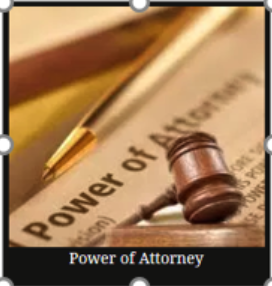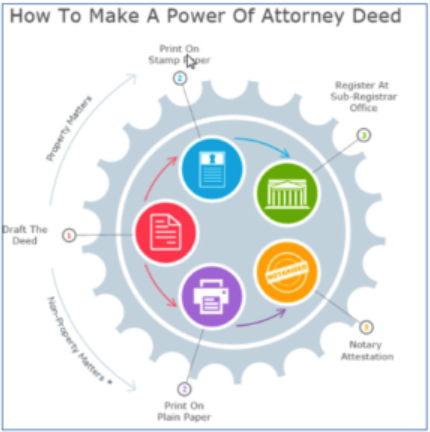Power of Attorney
A power of attorney is a legal document that allows you to appoint another person to take control of your affairs should you become unable to effectively do so or are in another city and have logistical problems on making and implementing decisions. The person appointed becomes attorney-in-fact, and the person who appoints is known as the principal . There are various types of
. There are various types of
powers of attorney and the one that you choose depends on the requirements of your current situation.
Usually Power of Attorney is created by anyone who cannot do the transactions in person by himself or herself due to various reasons. The following are the reasons that commonly force an individual to give the power of performing to another person.
- residing abroad and unable to be present for the task
- illness and bedridden
- old age or senior citizens with health problems
- or any other reason for being unable to conduct the transactions personally
- Non-Durable Power of Attorney
The non-durable power of attorney is used only for a set period of time and usually for a particular transaction in which you grant your agent authority to act on your behalf. Once the transaction is completed, or should the principal become incapacitated during this time, the non-durable power of attorney ceases.
- Durable Power of Attorney
The durable power of attorney is much more encompassing than the non-durable power of attorney and it can be used to allow an agent to manage all the affairs of the principal should they become unable to do so. It does not have a set time period and it becomes effective immediately upon the incapacitation of the principal. It does expire upon the principal’s death.
- Special or Limited Power of Attorney
A special or limited power of attorney is used on a limited basis for one-time financial or banking transactions, or for the sale of a particular property. This is most often used when the principal is unable to complete the transaction due to prior commitments or illness and wants to appoint an agent to act on their behalf. The agent has no other authority to act on behalf of the principal other than what is assigned to them in the limited power of attorney.
- Medical Power of Attorney
The medical power of attorney grants authority to the agent to take specific control over the healthcare decisions of the principal should they become incapacitated or unable to do so. This usually takes effect upon the consent of the presiding physician and it allows the agent to authorize all medical decisions related to the principal.
- Springing Power of Attorney
A springing power of attorney becomes effective at a future time and only when a specific event occurs, such as the incapacitation of the principal or a triggering event that occurs while the principal is out of the country and unable to act upon it. This type of power of attorney can be durable or non-durable and can encompass any number of affairs the principal wants to assign to the agent.
Regardless of your circumstances, there is a POA form that can be crafted specifically for your needs. This is a valuable tool to assist people with any legal requirement. Whether it be assuming control of their affairs because of incapacitation or taking charge of a business deal that a principal cannot attend because of other commitments, the power of attorney form allows people the flexibility and security to know their affairs are being looked after in a responsible manner.
HOW ?

If a person wants to authorise someone to act as a power of attorney on his behalf, it must be signed and notarised by a certified notary advocate, who is able to declare that you are competent at the time of signing the document to issue the said power of attorney. You will need to show your ID to the notary advocate before he/she is able to certify and issue the document. It must be executed and authenticated by the registrar or sub-registrar of assurances as per the ‘Registration Act, 1908’.
A power of attorney which is accurately authenticated by the notary or any magistrate, anhas to be filed with all the original documents of the power of attorney authorising an agent to do certain acts. All the documents will be verified by the court and then court will register power of attorney by putting seal and sign. It is very much essential to make the power of attorney valid.
Registration of power of attorney is optional In India, some states require it.
A power of attorney is chargeable under Section: 48 of Schedule 1 of the ‘Indian Stamp Act, 1899’. A stamp duty has to be paid compulsorily by the principal or donor in the jurisdictional registrar’s office.
The pricing is very varied from place to place one professional to another – to get a pricing estimate – use this link – https://legaldesk.com/form/common/pricecalculator
Important Clauses In A Power Of Attorney
While creating a Power of Attorney it is important to include certain mandatory clauses depending upon the type of power of Attorney that is made. Some of the essential clauses that needs to be included in the Power of Attorney deed are as follows:
- The name, age, address and occupation of the person who makes the Power of Attorney, the Principal.
- The person to whom the power is granted, the Attorney.
- The reason for granting the power of Attorney which should be legally valid.
- The date and place of making the Power of Attorney deed and the date from which it comes into force.
- The date of termination of the power of Attorney if it is limited by time. If no time is specified mention whether the Power of Attorney is durable or non-durable.
- If it is a general power granted then all the acts and areas of granting the power should be mentioned clearly. Whether any particular act is not to be done by the Attorney in certain areas should be specified. For. Eg. If general power for property is granted, the Principal can grant the power to buy or rent any property but may not grant the power to sell any of his property.
- In Special power of Attorney the specific or particular act or task that needs to be done and completed by the Attorney is to be clearly mentioned. Also the time limit within which that act is to be done is also to be specified.
Sneha Ramamurthy
Dilzer Consultants Pvt Ltd
Credits :
https://www.investopedia.com/articles/personal-finance/101514/power-attorney-do-you-need-one.asp#ixzz599LkLDgo
16 March 2018
